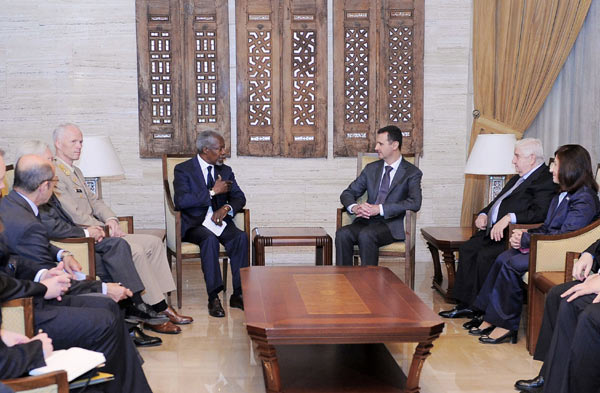Annan urges pacifying Syria's situation
Updated: 2012-05-30 06:41
(Xinhua)
|
||||||||
DAMASCUS - International envoy to Syria Kofi Annan stressed here on Tuesday the necessity of implementing his six-point peace plan in order to stem the violence, as the West has taken an even more hard-line stance towards the country and started expelling Syrian diplomats.
 |
|
UN-Arab League Joint Special Envoy for Syria (JSE) Kofi Annan(fourth left), Norwegian Maj. Gen. Robert Mood, head of the UN observer team in Syria(third left), Syrian President Bashar Assad(third right), and Syrian Foreign Minister Walid Moallem(second right) attend a meeting in Damascus, Syria. Annan met Syrian President Bashar Assad on Tuesday following a massacre last week that killed more than 100 people and sparked widespread international condemnation against Damascus. SANA/Associated Press |
Annan, who is on a three-day visit to Syria to discuss the prospect of his six-point peace plan, said he is worried about the future of Syria and its stability if his plan, which calls mainly for a full cessation of violence, is not implemented.
"We need to create an avenue to bring people together to the table," he said, noting that the plan will "pacify the environment and create the right atmosphere for political negotiations."
Annan's remarks were made during a press conference after meeting with Syrian President Bashar al-Assad Tuesday.
He said violence must end in the country and urged all parties to exercise self-restraint and abide by the six-point plan.
"I appeal to him (Assad) to take bold steps now, not tomorrow, now, to create momentum for the implementation of the plan," he said.
He also appealed to the armed opposition to cease violence and "asked all states with influence to press upon the government and all parties the need for a cessation of violence in all its forms, including continued human rights abuses."
Annan said he had conveyed to Assad "in frank terms the grave concern of the international community about the violence in Syria including the recent shocking events in Houla," noting that Assad had condemned the incident too.
On Friday, more than 100 people were killed in a massacre that occurred in the central village of Houla near Homs.
The Syrian government and the opposition traded barbs over the bloody attack that did not even spared children. UN says more than 40 kids under the age of 10 were killed in the massacre.
The Syrian government categorically denied any involvement in the carnage and accused armed groups of carrying out the killings in order to frame the government before the advent of Annan to Syria.
Opposition activists, meanwhile, accused the government forces of shelling the village, adding that pro-government militias have done the bulk of the killings after the army's alleged bombardment.
Syria has set up an inquiry committee to probe the circumstances of the carnage to bring the assailants to trial. It said the investigation's results should be out in three days.
Meanwhile, Assad stated during his meeting with Annan Tuesday that the success of Annan's plan relies on halting the terrorist acts as well as the commitment of the countries that support and harbor the armed terrorist groups.
On Tuesday, Syrian deputy foreign minister stressed Syria's resolution and readiness to implement the UN-backed six-point peace plan, accusing the opposition of not willing to abide by the plan which is meant to bring the 15-month unrest in Syria to a close.
"During this time of (ceasefire), Syria has not done a single violation of Annan's plan," Mikddad said, contending that the other party "has not committed to a single point."
"This means that there is a decision not to implement Annan's plan and make it fail by the armed groups and the opposition," he added.
While this drags on, the international community seems to have grown more frustrated with the Syrian administration as it implicitly holds the Syrian government responsible for the massacre in Houla.
The Houla incident has sparked wide-scale international condemnation, and on Tuesday new measures against Syria have surfaced in the form of expelling Syria's diplomatic missions.
Spain, the United States, Germany, Britain, Italy, Australia and France announced Tuesday to expel Syrian top diplomats in their countries as part of a coordinated Western diplomatic response to the Houla massacre.
George Gabbour, an ex-parliamentarian and political analyst, said the step to cut diplomatic relation would not be conducive to finding a diplomatic and political solution to Syria's crisis.
He said amid such crises, diplomatic relations should be intensified not ruptured.
For his part, Abdul-Aziz Khair, a Syrian opponent, said expelling the diplomatic missions is a strong response that entails messages and clear signs, which the Syrian government needs to understand.
Other observers contended that what happened in Houla was staged by a third party with the aim of repeating what happened in Yugoslavia when a massacre led later to its division.

 Relief reaches isolated village
Relief reaches isolated village
 Rainfall poses new threats to quake-hit region
Rainfall poses new threats to quake-hit region
 Funerals begin for Boston bombing victims
Funerals begin for Boston bombing victims
 Quake takeaway from China's Air Force
Quake takeaway from China's Air Force
 Obama celebrates young inventors at science fair
Obama celebrates young inventors at science fair
 Earth Day marked around the world
Earth Day marked around the world
 Volunteer team helping students find sense of normalcy
Volunteer team helping students find sense of normalcy
 Ethnic groups quick to join rescue efforts
Ethnic groups quick to join rescue efforts
Most Viewed
Editor's Picks

|

|

|

|

|

|
Today's Top News
Health new priority for quake zone
Xi meets US top military officer
Japan's boats driven out of Diaoyu
China mulls online shopping legislation
Bird flu death toll rises to 22
Putin appoints new ambassador to China
Japanese ships blocked from Diaoyu Islands
Inspired by Guan, more Chinese pick up golf
US Weekly

|

|






